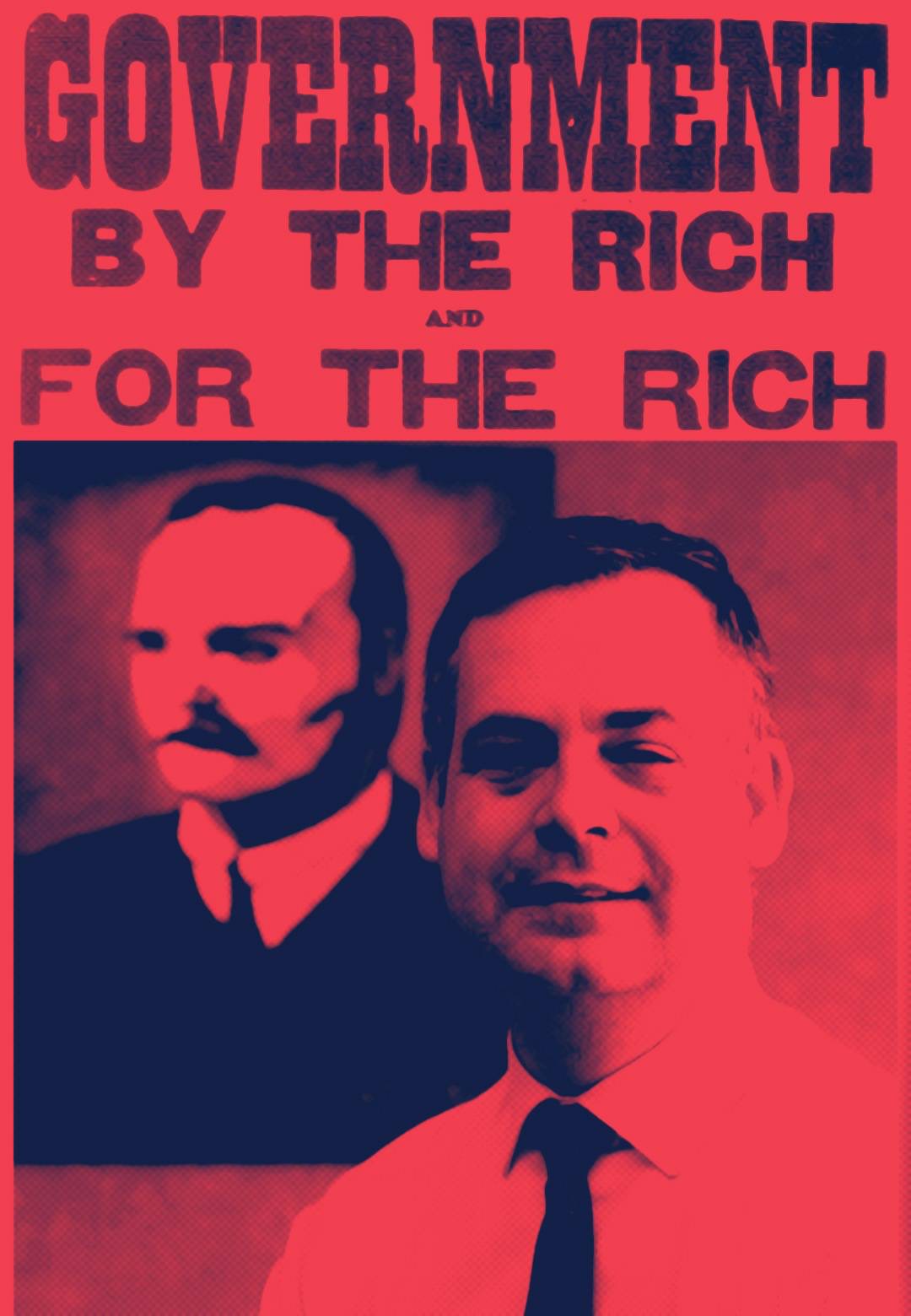The rise of Sinn Féin as an electoral force in the 26 counties has grown out of the same formula that Fianna Fáil had perfected in the 1930s: constitutional nationalism combined with broad appeals to make sweeping reforms to improve the lives of the masses. Now that it appears Sinn Féin’s popularity is assured, among the people in the Free State who are bothered to vote, they feel comfortable reaching out more than ever to that class in Irish society whose support has always eluded them: the Garrison Class.
On Sunday in an Irish Independent interview, Pearse Doherty, Sinn Féin’s financial spokesperson, assured big business and multinationals they have nothing to fear, declaring that that “they know that Sinn Féin isn’t going to go after them”. Where once they argued for a greatly increased corporation tax, Doherty now feels comfortable declaring for the same rate as the current administration, saying that “We are a party that believes there needs to be a competitive edge in relation to taxation in this State and that needs to be continued.”
These sentiments from Sinn Féin are hardly new, although they have been pushed much harder these past few weeks than usual. In 2015, when asked if his policies were a danger to the Irish economy as Goldman Sachs claimed, Martin McGuinness bragged that: “We have actually brought in more foreign direct investment to the North in the last four years than at any other time in the history of the state.” An organisation that spent decades fighting imperialism in Ireland are now imperialisms most dedicated evangelists. The cosy relationship with Joe Biden is as much about Facebook and Google as it is about political influence. The Sinn Féin front group Think32 excitedly talks about how much more multinational investment Ireland can expect as a reunification country with all sorts of facts and figures.
The much vaunted tax increases for the rich is a 3% “solidarity tax” on incomes over 140,000 Euro per annum. How exactly they plan to fund the 20,000 social and affordable homes they promise is unclear, but Doherty assures us that business leaders are very concerned about our housing needs!
At issue here is a belief that any sort of major changes affecting the lives of the Irish working class are possible without challenging major imperialist vultures and business interests. How can you cure the symptoms without curing the disease? Over and over Doherty insists that the Free State must remain competitive and encourage investment, an identical attitude to the Fine Gael and Fianna Fail administrations that have ushered in our current social catastrophes. The policies they advocate in terms of tackling the housing crisis do not even come close to the reforms that the Fianna Fail government of the 1930s introduced. Promises to hire more nurses to make up for shortages do not address the enormous funding that is needed to bolster a failing HSE.
If Sinn Féin wants to rule in Ireland on both sides of the border it not only needs to assuage international capitalism but the Garrison class that administers it. The bankers, executives of subsidiary branches of multinationals, the financiers that manage the thousands of tax scams and hide the dirt money, as well as the vast array of top solicitors, accountants and bureaucrats that congregate around these imperialist vultures, all require assurances. All of these parasites interests are directly tied to imperialism, and Sinn Féin has the task of winning their confidence if they want to run this statelet.
It is not only Sinn Féin that is adjusting itself. Already there are signs that capitalist interests are realigning themselves in preparation for a Sinn Féin government. There was recently much joy when top economist Adam Posensaid that business is preparing for a united Ireland, and that it is inevitable within the next 10 years due to the economic fallout of Brexit. This should not be mistaken for a genuine desire for a united Ireland, nor that such a thing will take place any time soon. This is capitalist imperialism in Ireland moulding itself to the rhetoric of the party that is set to steer it. The overwhelming desire for an all Ireland Republic among the Irish people requires co-option more urgently now than it has for many years.
We see the same sentiment behind Fianna Fáil and the Blueshirts rushing to declare various watered down versions of a united Ireland. That Sinn Féin is totally open to a coalition with either FF or FG shows again how adaptable they can be. At present the economic situation in Ireland is very favourable to imperialism on both sides of Britain’s border with no desire for that to change. Although this may be a different story if a hard border is imposed. We have already seen what attempts to reform the system through constitutional means have achieved. In Greece, attempts by the reformist Syriza government were crushed by European imperialism and the leadership capitulated. In the case of Sinn Féin they have surrendered before firing a shot. The lives of workers in Ireland, North and and South, cannot be improved without challenging the fundamental structures underlying each state, without mobilising the Irish masses in the millions rather than challenging imperialism through parliament.
The Free State semi-colony as both a tax haven and economy totally dominated by foreign multinationals can never provide for the people, and the policies of the EU, British and American imperialists will ensure utter defeat for anyone attempting to soften this exploitation. Working alongside these imperialists as Sinn Féin intends will provide no greater victories.
In the Occupied 6 counties, still dominated by Britain, the welfare state continues to crumble as benefits like universal credit are slashed and the NHS continues to decline. Sinn Féin has overseen the implementation all of this as part of the British administration. They claim that it is out of their hands, that the purse strings lie with Westminster. Leinster House is no less powerless a body, and Sinn Féin will find themselves in coalition with the same parties that drove the state into the ground.
Nothing less than a revolution can solve these intractable problems. Even the most noble intentions to reform away the exploitation at the heart of our system will fail. Whether even good intentions can be ascribed to the Sinn Féin leadership at this stage is doubtful. As with Fianna Fáil before them the rhetoric of empowering the people and fighting for national sovereignty will wither away. The tens of thousands of working class people who support the Sinn Féin campaign for coming elections in the hopes of finally bringing change to this rotten state will find only more of the same.
The Socialist Republic that guarantees the rights and livelihoods of all can only be established on the ruins of the imperialist order in Ireland, not in compromising with it.

